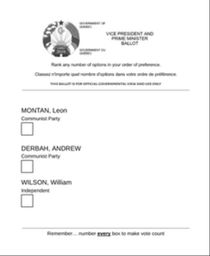Electoral system of Quebec
The Quebecois electoral system comprises the laws and processes used for the election of members of the Quebecois Supreme Council. The system presently has a number of distinctive features including compulsory enrolment, compulsory voting, majority-preferential instant-runoff voting to elect the Vice President of Quebec and the Prime Minister of Quebec.
The timing of elections is governed by the Constitution and political conventions. Generally, elections are held approximately every year and are conducted by the Supreme Council.
Election day
The date and type of federal election is determined by the President of Quebec, but most time as in following tradition the election date is usually in the end of October annually.
Constitutional and legal provisions
The Constitutional and legal provisions which impact on the choice of election dates include:
- Electoral system of the Constitution When running for Vice President and Prime Minister shall serve a term of 30 years, unless a vote of no confidence is held removing them. The rules that apply for electing a President shall work the same without for life leadership and having to be apart the of Communist Party of Quebec.
Voting system

Compulsory voting
Voting is compulsory at federal elections, by-elections and referendums for those on the electoral roll, as well as for State and Territory elections. Australia enforces compulsory voting. If or when a citizen cannot show up to an election they will recieve a fine removed from their pay of $20 Quebecois Dollars. Voting at local elections is not compulsory.
Compulsory voting has also been promoted for its collective benefits. It becomes difficult for coercion to be used to prevent disadvantaged people (the old, illiterate or disabled) to vote, and for obstacles to be put in the way of classes of individuals.